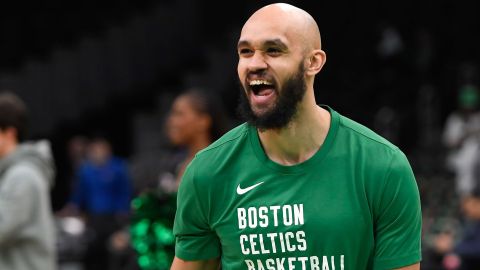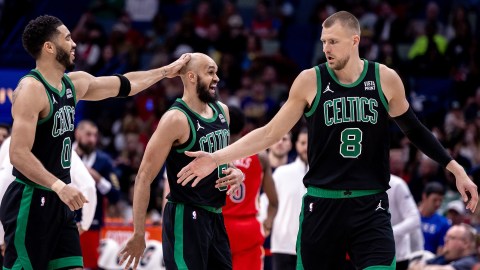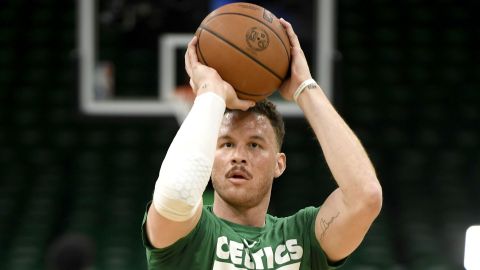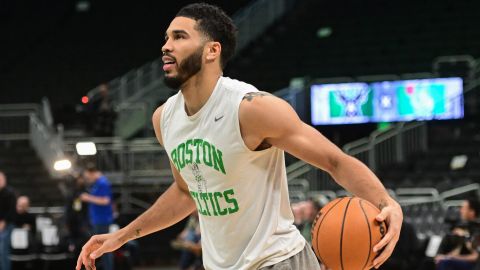 BOSTON — The year before Kevin Garnett came to Boston, he logged nearly 40 minutes per night for the Minnesota Timberwolves, purely out of necessity. That Wolves squad was so thin that the infamous Mark Blount was the third-leading scorer, and nobody other than Garnett grabbed more than five rebounds or blocked more than one shot a night.
BOSTON — The year before Kevin Garnett came to Boston, he logged nearly 40 minutes per night for the Minnesota Timberwolves, purely out of necessity. That Wolves squad was so thin that the infamous Mark Blount was the third-leading scorer, and nobody other than Garnett grabbed more than five rebounds or blocked more than one shot a night.
That was seven years ago.
The Celtics find themselves in a similar predicament now, as they morph from an all-around fearsome Garnett-led unit into a disjointed collection of individuals when he leaves the court. Celtics coach Doc Rivers does not have the luxury Dwane Casey and Randy Wittman had in 2006-07, however, when those coaches could count on a spry 30-year-old to play virtually every minute of every game.
A lot of things happened when Garnett took a seat during Boston’s 106-100 loss to the Philadelphia 76ers on Friday. As Rajon Rondo noted, nothing that happened was good. The issue was most pronounced at the end of the first half, when the Celtics trailed by 12 points and Garnett’s plus-minus was an even zero. That may not seem very noteworthy, except Garnett was the only member of the Celtics whose plus-minus was not a negative number.
“It’s chaos,” said Rondo, who took no solace in his 14-point, 20-assist performance that stretched his streak of games with double-digit assists to 29. “We’ve got to do a better job when Kevin’s not on the floor. I’m not sure what the plus-minus is with him, but he showed it in the playoffs last year, and now it’s carrying over. When Kevin goes out, things change. Teams go on runs for some reason in the past couple games. We’ve got to take the challenge as a team and try to find a way to stop those types of runs when he does go out of the game, because he’s going to come out [eventually].”
Since Rondo did not know Garnett’s plus-minus offhand, let us help him out. Garnett’s plus-minus rating this season is a modest 1.8, but as Rondo mentioned, last year’s playoff run magnified the matter. The Celtics were seven points better when Garnett was on the court in the playoffs and an impressive 12.4 points better with him on the court at home.
Taking a more scientific tack, Garnett made the Celtics nearly 10 points better than the opposition per 100 possessions, both offensively and defensively, during their 20-game postseason run. In context, that number would have put Garnett in the company of LeBron James, the runaway winner of the Most Valuable Player award, during the regular season.
The conversation about the Celtics’ struggles thus far has focused on last summer’s roster changes and Rivers’ attempts to break in new lineups with different personnel. The coach took issue with that characterization on Friday, though, insisting that developing chemistry was important, but of secondary importance to simply figuring out how not to fold whenever Garnett does not play.
“You’ve got to find the right group, and I think we have that,” Rivers said. “We just aren’t playing well. The thing that’s hurting us right now is when Kevin’s going off the floor. … Because every time we do it — and we have to do it — we’re struggling. That’s on me. I’ve got to figure that out, because he’s not going to be on the floor [all the time]. He’s coming out. He’s coming out at the exact time and we have to figure out something to make us click, and I think it’s on both ends. I don’t think just our defense goes down. I think our offense really struggles when he goes out. We have to do something better.”
Rondo, Rivers and the rest of the established members of the team have been loath to single out individual players and their flaws, but one theme of Rondo’s postgame interviews has become the persistent failures in communication. Without Garnett directing, the Celtics are not as talkative on offense or defense, and that leads to predictable breakdowns.
As Allen Iverson famously sneered, “How am I going to make my teammates better by practicing?” Honestly, Garnett has no obligation to make sure his teammates play better when he takes a rest. That is Rivers’ job. But Garnett has never been as averse to practice as Iverson or some other players, and he did not reject his role in helping his teammates improve.
“The things I know, I know from over the course of a couple decades,” Garnett said, laughing at his own longevity. “I understand how to actually play this game and my role at this point in my career. A lot of things is just how hard I’m doing it. I talk very loud. I’m continuous with the things I do. I try to carry that over to the offensive end at times, and I try to be aggressive. The things I know are through experience, and trying to give that to a younger guy or somebody who hasn’t played in the league that long, it’s difficult at times, but I try to lead by example. Anybody that’s looking to learn, I’m always willing to teach.”
If Garnett can teach his teammates how to instantly make their team and everyone around them better, that might be a good place to start. Because that is what they miss when Garnett sits down, and that is what they need the most.
Have a question for Ben Watanabe? Send it to him via Twitter at @BenjeeBallgame or send it here.



